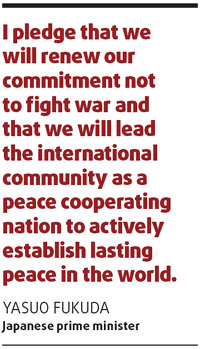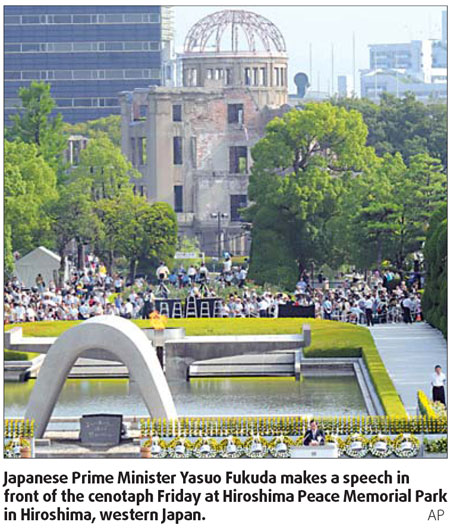August 15, a day for peaceful prayer
August 15 was the day when national memorial services are held for the war dead. As the years have gone by, this date marking the end of the war in 1945 is becoming a historical memory.
However, despite the passage of time, the significance of paying tribute to the memory of those who sacrificed their lives for Japan and of pledging peace on this day has not changed.
The memorial service held on Friday at the Nippon Budokan in Kudan, Tokyo, is the nation's supreme event as it is attended by the Emperor, the Empress and the heads of the three branches of state power: the prime minister, the heads of both chambers of the Diet and the chief justice of the Supreme Court.
This date also is a day on which heated debates are held over the Yasukuni Shrine, which enshrines Class-A war criminals along with the war dead.

"Yasukuni", a documentary film by a Chinese director that received much attention earlier this year, focused on military swords known as Yasukuni-to crafted on the shrine's premises. The movie appears to have depicted the shrine by overlapping it with the image of militarism.
But ordinary Japanese can never imagine militarism being revived in this country.
Prime Minister Yasuo Fukuda has explicitly said he will not visit the Yasukuni Shrine. Before assuming the post of prime minister, Fukuda said: "In relations between a country and another country, it's unnecessary to dare do something that the other would dislike." Those remarks were made with China and other countries in mind.
Last year, then prime minister Shinzo Abe did not visit the Yasukuni Shrine. Abe took an "ambiguous strategy" of not mentioning whether he would or would not visit the shrine.
Recently, the former prime minister spoke of this strategy, saying he thought he did not need to do something that would provoke China and worsen relations with Beijing, but that he also thought he should not abandon the "possibility and right to visit the Yasukuni Shrine."
In his visit to India in late August last year, Abe met with the eldest son of the late Radhabinod Pal. Pal served as a judge representing India in the international military tribunal for the Far East, which is better known as the Tokyo Tribunal.
Pal was the only justice among 11 judges to present not guilty verdicts to all accused in the tribunal.
Biographies and other books on Pal have been published recently, leading to a renewed interest in the man.
Publishing Pal's dissenting opinion was banned under the occupation of GHQ.
On April 28, 1952, the San Francisco Peace Treaty took effect and Japan regained its sovereignty. Immediately after the treaty took effect, Pal's decision was published as "Nihon Muzairon" (On Japan's Innocence: The Truth on Trial) in abridged translation and became an instant best seller.
However, there was debate at that time whether the expression "Nihon Muzairon", which is directly translated as "Japan innocence theory", was appropriate. In recent years, a similar debate has taken place.
The Pal decision does not deny that barbaric and cruel actions such as the killing of civilians and other violent acts took place in Imperial Japanese Army-occupied areas.
However, the main point of the Pal decision is that it is impossible to deliver judgement on the defendants in light of international law at that time.
He thought the Tokyo Tribunal was a "sham employment of legal process for satisfaction of a thirst for revenge" by the victorious against the defeated. In light of their history of imperialism and colonial rule, the United States and Europe were not qualified to try Japan, he argued.
Should the indiscriminate destruction of lives and property of noncombatants be an issue, he pointed out, the decision to use atomic bombs "is the only near approach to the directives...of the Nazi leaders".
However, separately from the issue whether war crimes existed under international law, responsibility surely exists.
Why did Japan start a reckless, unwinnable war and leave huge numbers of victims at home and abroad?
Was it impossible for the country to prevent the atomic bombings of Hiroshima and Nagasaki through actions to end the war peacefully beforehand?
Starting in the summer of 2005, the 60th anniversary of the end of World War II, The Yomiuri Shimbun spent a year reexamining the responsibilities of Japan's wartime political and military leaders. The Yomiuri re-examination committee concluded that those whom it judged responsible for war crimes were indeed many of the Class-A war criminals of the Showa War at the Tokyo Tribunal, including former prime minister Hideki Tojo.
The committee also deemed certain Class-A war criminals as not severely responsible, and also judged others that were not subject to the Tokyo Tribunal as having bore heavy responsibilities in the Sino-Japanese War and in starting the war against the United States.
Opinion on the so-called separate enshrinement issue of Class-A war criminals at the Yasukuni Shrine has changed since a memorandum describing the feelings of late Emperor Showa by former Imperial Household Agency Grand Steward Tomohiko Tomita was found in 2006. The memo revealed that Emperor Showa was displeased with the enshrinement of Class-A criminals with the war dead at the shrine.
It has been learned that the separate enshrinement issue has been talked about recently even among members of the Japan War Bereaved Families Association (Nippon Izokukai), an association of families of the war dead.
At present, it is most likely that the government again will not earmark in next fiscal year's budget costs for a preliminary investigation into constructing a national, nonreligious memorial for the purpose of resolving this issue.
However, if the Yasukuni side does not take appropriate action, the argument will gain momentum for expanding the Chidorigafuchi National Cemetery for the War Dead in central Tokyo so that it can be the main facility for the Emperor to offer prayers.
We hope the issue of a national memorial facility will be settled at the earliest possible date to make Aug 15 the day for all Japanese people to commemorate peacefully the nation's war dead.
The Yomiuri Shimbun

(China Daily 08/17/2008 page11)














